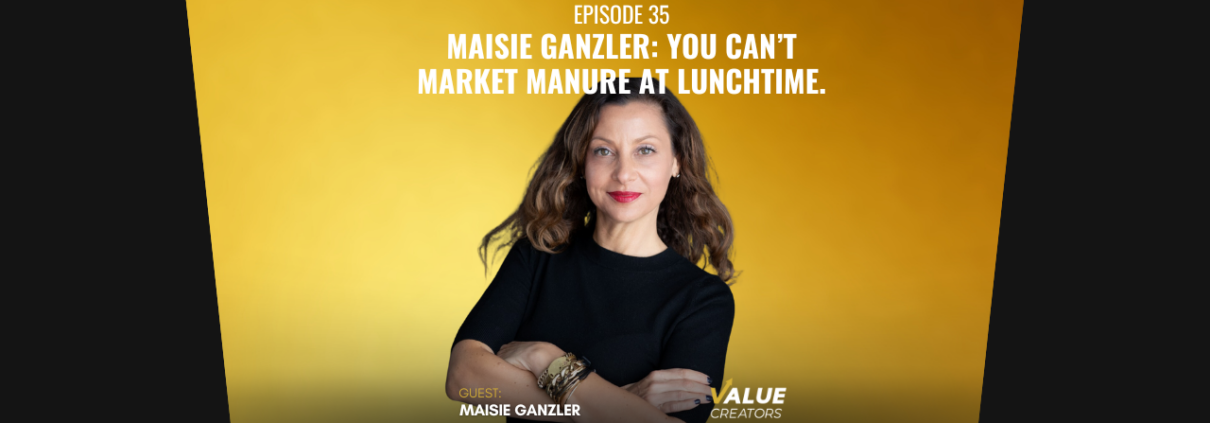The Value Creators Podcast Episode #35. Maisie Ganzler: You Can’t Market Manure At Lunchtime
Sustainability in the food supply chain has become a vital consideration for the resolution of food chain risk. It’s also become a mission for some food producers and distributors and for some food brands, it’s become a marketing mandate.
Maisie Ganzler has been orchestrating the critical alignment required for the pursuit of sustainability in the food supply chain and articulating the crucial alignment between marketing and operations. Maisie perfected the concept of organizational support for sustainability, highlighting the creation of specialized roles like the “forager” to facilitate local sourcing initiatives and overcome procurement obstacles. She introduced metrics and tools to track sustainability goals using tools.
Passion supplies energy but it’s ineffective without leverage, pointing to procurement decisions and organizational culture as key leverage points. Flexibility and adaptability – versus ideology – are essential traits in responding to evolving challenges and opportunities in sustainability efforts. Maisie Ganzler delves into the relationship between personal health and sustainable dietary choices, highlighting the alignment between whole foods consumption and planetary health goals.
By integrating marketing, operations, and organizational support, businesses can navigate challenges, build strong relationships, and drive meaningful change toward a more sustainable future.
Resources:
To connect with Maisie: Maisie Ganzler
Find out more about Maisie Ganzler: maisieganzler.com
Get the book: You Can’t Market Manure at Lunchtime
Get the book on Amazon: You Can’t Market Manure at Lunchtime
Show notes:
0:00 | Intro
01:57 | You Can’t Market Manure at Lunchtime: Maisie Ganzler Defines Sustainability
04:38 | Consumer-First: Flavor as Key Benefit
05:26 | Mission is Actionable Steps
07:02 | What Purpose is About?
08:27 | Bon Appétit Management Company: Business Side
10:31 | Who is Your Customer?
12:25 | Subjective Values
14:54 | Tradeoffs: Most Challenging
17:29 | Pick One Narrative
19:34 | How Do We Get Our Stories Straight?
21:29 | Marketing is Communication
23:08 | The Forager: Deeper Relationship
25:33 | Scaling Corporation
27:26 | Measurement in General
31:18 | Passion
32:34 | You Can Make a Difference: Empowering Through Collaboration
35:47 | Adaptability: Don’t Be Rigid
38:07 | Safety: Eat Lancet Report
39:41 | Wrap-Up: When Will the Book Be Published?
Knowledge Capsule
Sustainability:
- Sustainability can be defined as a multifaceted approach that encompasses environmental responsibility, ethical sourcing, and social impact within business operations
- It goes beyond mere rhetoric, requiring concrete actions and operational changes across all facets of an organization, including supply chain management, procurement practices, and employee engagement.
Consumer Focus:
- Consumers must be the first focus. They seek flavor as their key benefit before anything else.
- Maisie emphasizes that marketing narratives must align with tangible actions and operational changes. This ensures that consumer expectations are met, fostering trust and authenticity in the brand.
- Organizations are urged to prioritize transparency in their supply chains, supporting local vendors and sustainable practices. This not only meets consumer demands for ethically sourced products but also strengthens relationships with suppliers and enhances product quality.
Mission and Purpose:
- Creation of a mission or dream to establish an emotional connection and guide company direction.
- Purpose as the driving force behind brand identity and employee alignment.
Business Aspects of Sustainability:
- Maisie shares her point of view that leveraging sustainability is a business differentiator and revenue driver.
- Integration of sustainability into business operations and decision-making processes.
Customer Perspective:
- Dual customer focus in B2B food service: decision-makers and end consumers.
- Creation of value for suppliers deep in the supply chain through enhancing their brand with sustainable practices.
Tradeoffs and Strategic Focus:
- Prioritization of sustainability initiatives and avoidance of resource spreading. Focus is key. Don’t try to do too much. Stand for something specific.
- Balancing cost-saving measures with investments in quality and sustainability to drive revenue.
Pick one narrative :
- Before communicating sustainability initiatives, organizations must first implement tangible changes in their operations and supply chains.
- This approach ensures authenticity and credibility in the narrative, aligning with consumer expectations for a genuine commitment to sustainability.
- Crafting a clear and consistent sustainability narrative to communicate complex concepts to stakeholders effectively.
Getting the Story Straight:
- Practicing and refining sustainability messaging within the organization to ensure accuracy and credibility in communication efforts.
Marketing as Communication:
- Marketing goes beyond branding and advertising; it involves actions that align with promises made.
- Operations should precede marketing; actions should match the narrative.
Organizational Support for Sustainability:
- Creating new positions, such as “forager,” to support sourcing locally and building relationships with vendors.
- Overcoming barriers like complex purchasing systems by offering support to local vendors.
Empowering Middle Management:
- It’s possible to make a big difference from the middle.
- Middle managers play a crucial role in driving sustainability initiatives within organizations.
- Sustainability initiatives can provide fulfillment and creativity for employees at all levels.
Measurement and Accountability:
- Implementing measurement tools like the “red-yellow-green tracker” to monitor sustainability commitments.
- Continuously improving and adapting based on progress made in moving metrics from red to green.
Passion with Leverage:
- Passion for sustainability must be paired with leverage to implement meaningful changes.
- Leveraging procurement budgets, hiring decisions, and organizational structures to drive sustainability efforts.
Adaptability and Flexibility:
- Maisie acknowledges that science, social norms, and cultures are constantly evolving.
- Being flexible in decision-making, even if it means taking risks, to stay ahead and lead in sustainability.

Leave a Reply
Want to join the discussion?Feel free to contribute!